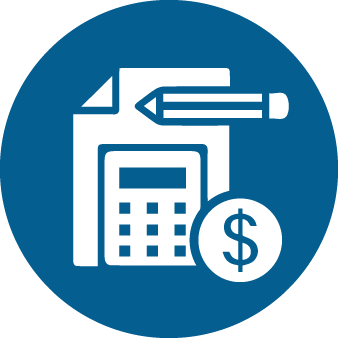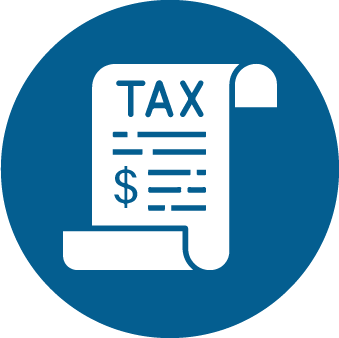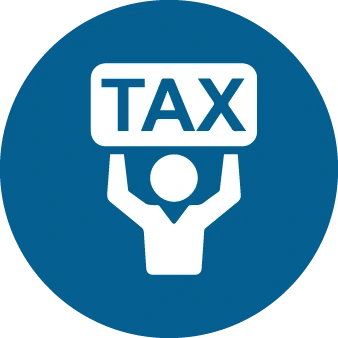Picture this: You wake up Monday morning, grab your coffee, and check your bank account balance before heading to work. Your heart sinks as you see a balance of $0.00 where thousands of dollars should be. Your account has been frozen due to a bank levy, and suddenly you can't pay rent, buy groceries, or cover basic expenses.
If this nightmare scenario sounds familiar, you're not alone. Thousands of New Jersey residents face bank levies every year, often catching them completely off guard. The good news? You have options, and with the right knowledge, you can fight back effectively.
When facing complex financial challenges like bank levies, having expert guidance makes all the difference. Precision Accounting Intl specializes in helping New Jersey residents navigate debt collection issues, tax problems, and financial recovery.
What is a Bank Levy and How Does it Work in New Jersey?
A bank levy is a legal procedure that allows creditors to freeze and seize funds directly from your bank account to satisfy an unpaid debt. Unlike wage garnishment, which takes a portion of your paycheck over time, a bank levy can wipe out your entire account balance in one fell swoop.
Here's how the process typically unfolds in New Jersey:
- Original Lawsuit: A creditor files a lawsuit against you for unpaid debt
- Judgment Obtained: If you don't respond or lose the case, the court enters a judgment
- Writ of Execution: The creditor requests a writ of execution from the court
- Notice of Levy: The sheriff serves you with a notice of execution and levy
- Account Frozen: Your bank receives the levy and immediately freezes your account
- Funds Seized: After the objection period expires, funds are turned over to the creditor
Key players in this process include:
- The judgment creditor (the party you owe money to)
- The court (typically the Special Civil Part)
- The sheriff's office (who serves the levy)
- Your bank (who must comply with the court order)
The entire process from lawsuit to levy can take several months, but many people are unaware of the pending lawsuit until their account is suddenly frozen. When facing complex financial challenges like this, many individuals benefit from working with experienced accounting firms in nj who understand both tax obligations and debt collection procedures.
What You MUST Do After Receiving a Notice of Levy
This is the most important section of this entire guide. Once you receive a notice of execution and levy, you have exactly 10 calendar days to file an objection with the court. Missing this deadline could mean losing your funds permanently.
Here's what happens during those crucial 10 days:
- Day 1: You receive the notice of levy (the day you're served)
- Days 1-10: You have this window to file your objection
- Day 11: If no objection is filed, the court may order your bank to turn over the funds
Important deadlines to remember:
- The 10-day period includes weekends and holidays
- Your objection must be filed with the court AND served on the creditor's attorney
- Filing by mail is acceptable if postmarked within the 10-day period
Don't wait until day 10. Court offices can be busy, and you don't want to risk missing the deadline due to long lines or technical issues with electronic filing.
Claiming Exemptions in New Jersey
Not all money in your bank account can be seized through a levy. Both federal and New Jersey state law provide important protections for certain types of income and funds.
Federal Exemptions That Apply in New Jersey
The following funds are generally protected from bank levies:
- Social Security benefits (including retirement, disability, and survivor benefits)
- Supplemental Security Income (SSI)
- Veterans Affairs (VA) benefits
- Railroad retirement benefits
- Federal employee retirement benefits
- Unemployment compensation
- Workers' compensation benefits
New Jersey State-Specific Exemptions
New Jersey provides additional protections:
- $1,000 personal property exemption (applies to cash and bank accounts)
- 90% of wages (only 10% can be garnished, and wages in your account may be protected)
- Public assistance benefits (TANF, General Assistance, SNAP)
- Child support payments received by the obligee
- Pension and retirement account funds
For those nearing retirement age, understanding retirement planning in NJ becomes crucial as retirement funds often receive special protection from creditors.
How to Prove Your Exemptions
Documentation you'll need:
- Bank statements showing direct deposits from exempt sources
- Award letters from Social Security, VA, or other agencies
- Pay stubs showing the source of deposited wages
- Documentation of public assistance benefits
Pro tip: Keep separate accounts for exempt funds when possible. Mixing exempt and non-exempt funds can complicate your case.
How to File an Objection to a Bank Levy in NJ
Filing an objection is your primary tool for fighting a bank levy in New Jersey. Here's exactly how to do it:
Step 1: Obtain the Proper Forms
You'll need two main forms:
- Form 11.2: Motion to Claim Exemption
- Form 11.3: Certification in Support of Motion
These forms are available on the New Jersey Courts website or at any courthouse.
Step 2: Complete Form 11.2 (Motion to Claim Exemption)
Fill out the following sections carefully:
- Caption: Copy the case information exactly from your notice of levy
- Your Information: Full legal name and address
- Exemption Claimed: Check the appropriate boxes and specify dollar amounts
- Relief Requested: Typically "release of exempt funds"
- Signature and Date: Must be signed under penalty of perjury
Step 3: Complete Form 11.3 (Certification)
This form requires detailed information about:
- The source of funds in your account
- Why you believe the funds are exempt
- Supporting documentation you're providing
- A sworn statement that your information is true
Step 4: Gather Supporting Documentation
Include copies of:
- Bank statements showing deposits
- Social Security award letters
- Pay stubs or unemployment documentation
- Any other proof of exempt income
Step 5: File Your Objection
You have three options for filing:
- Electronic Filing (JEDS): Available 24/7 through the NJ Courts website
- Mail Filing: Send certified mail to the court address on your notice
- In-Person Filing: Visit the courthouse during business hours
Important: You must also serve a copy on the creditor's attorney within the same 10-day period.
Step 6: Pay the Filing Fee (If Required)
Most exemption motions have a minimal filing fee, typically $5-15. Fee waivers are available for those who qualify based on income.
What Happens After You File an Objection?
Filing your objection is just the first step. Here's what to expect next:
The Court Hearing Process
Within 30-45 days of filing your objection:
- The court will schedule a hearing (often conducted virtually)
- You'll receive notice of the hearing date and time
- Both you and the creditor's attorney can present arguments
Preparing for Your Hearing
Come prepared with:
- All original documentation supporting your exemption claim
- A clear explanation of why your funds should be protected
- Any additional evidence that supports your case
What to expect during the hearing:
- The judge will review your exemption claim
- The creditor's attorney may argue against your exemption
- You'll have the opportunity to present your case
- The judge will make a decision, often immediately
If Your Objection is Successful
When you win your exemption claim:
- The court will enter an order directing the bank to release your funds
- The bank typically has 5-10 business days to comply
- You should follow up with your bank to ensure prompt release
If Your Objection is Denied
Don't give up if your initial objection fails:
- You may have grounds to appeal the decision
- Consider whether you missed any available exemptions
- Explore other options like bankruptcy or negotiation
Other Ways to Stop a Bank Levy
Negotiating with the Creditor
Settlement negotiations can be effective:
- Contact the creditor's attorney immediately
- Propose a lump-sum settlement for less than the full amount
- Request a payment plan that works with your budget
- Get any agreement in writing before making payments
Benefits of negotiation:
- Can stop the levy process immediately
- May resolve the debt for less than you owe
- Avoids the stress and uncertainty of court proceedings
Filing for Bankruptcy
Bankruptcy provides powerful protection through the automatic stay:
Chapter 7 Bankruptcy:
- Stops all collection activities immediately
- May discharge unsecured debts entirely
- Process typically takes 4-6 months
- Requires passing a means test
Chapter 13 Bankruptcy:
- Creates a 3-5 year repayment plan
- Allows you to catch up on secured debts
- Stops foreclosure and repossession
- More flexibility for higher-income debtors
The automatic stay takes effect immediately upon filing and stops:
- Bank levies and wage garnishments
- Foreclosure proceedings
- Utility shutoffs
- Creditor phone calls and letters
Challenging the Original Judgment
If you never received proper notice of the lawsuit:
- File a motion to vacate the default judgment
- Argue that you weren't properly served
- Present any defenses you have to the underlying debt
Common grounds for challenging a judgment:
- Improper service of process
- Expired statute of limitations
- Identity theft or fraud
- Debt was already paid or discharged
Using the Statute of Limitations Defense
New Jersey statute of limitations for common debts:
| Debt Type | Statute of Limitations |
|---|---|
| Credit Card Debt | 6 years |
| Medical Debt | 6 years |
| Personal Loans | 6 years |
| Auto Loans | 6 years |
| Mortgage Debt | 6 years |
Important notes:
- The clock starts from your last payment or acknowledgment of the debt
- Making a payment can restart the statute of limitations
- You must raise this defense; courts don't apply it automatically
If you're dealing with tax-related debt specifically, understanding how long can NJ collect back taxes can help you determine your options for older tax obligations.
How to Prevent a Bank Levy Before It Happens
The best defense is a good offense. Here's how to prevent a bank levy from happening in the first place:
Respond to Lawsuits Promptly
If you're served with a debt collection lawsuit:
- File an answer within 35 days (New Jersey rule)
- Raise any available defenses
- Consider hiring an attorney
- Don't ignore the lawsuit hoping it will go away
Use Debt Validation Strategies
When contacted by debt collectors:
- Request debt validation within 30 days
- Verify that the collector has the right to collect
- Check that the debt amount is accurate
- Ensure the statute of limitations hasn't expired
Create a Debt Management Plan
Work with a nonprofit credit counseling agency to:
- Negotiate with creditors for lower payments
- Consolidate multiple debts into one payment
- Create a realistic budget
- Avoid future financial problems
Consider Bankruptcy Before Judgment
Filing bankruptcy before a judgment is entered can:
- Discharge debts without wage garnishment or levies
- Protect your assets more effectively
- Give you more negotiating power with creditors
- Cost less than fighting multiple collection lawsuits
Businesses facing financial difficulties should also explore part-time cfo services to help manage cash flow and avoid situations that could lead to bank levies.
Special Cases: Levies on Joint Accounts
Joint bank accounts present unique challenges when faced with a levy. Here's what you need to know:
How Joint Accounts Are Treated
In New Jersey:
- Both account holders are typically liable for the full account balance
- A levy against one person can freeze the entire account
- The non-debtor spouse may have rights to protected funds
Protecting Your Portion of Joint Funds
To protect funds belonging to the non-debtor:
- File an exemption claim showing the source of your deposits
- Provide documentation proving ownership (pay stubs, Social Security deposits)
- Consider separate accounts for individual income
- Keep detailed records of who contributed what funds
For businesses managing multiple accounts and complex financial structures, professional bookkeeping services in new Jersey can help maintain proper documentation that proves fund ownership and sources.
Special Protections for Spouses
New Jersey law provides some protection for:
- Funds deposited by the non-debtor spouse
- Social Security and other exempt income belonging to the spouse
- Assets that can be traced to the non-debtor's separate property
Evidence needed to prove separate ownership:
- Bank statements showing direct deposits
- Pay stubs in the non-debtor's name
- Documentation of gift or inheritance funds
- Any other proof of separate ownership
When to Hire an Attorney
While you can handle many aspects of fighting a bank levy yourself, certain situations call for professional legal help.
You Should Consider Hiring an Attorney If:
Your situation involves:
- Large amounts of money (more than you can afford to lose)
- Complex exemption issues
- Multiple creditors and judgments
- Business accounts or assets
- Potential bankruptcy filing
You're facing:
- Tight deadlines you're struggling to meet
- Language barriers or difficulty understanding forms
- Creditors who refuse to negotiate
- Repeated collection attempts despite exemptions
What to Look for in a Bank Levy Attorney
Choose an attorney with:
- Specific experience in debt collection defense
- Knowledge of New Jersey exemption laws
- A track record of successful bank levy cases
- Reasonable fees and payment plans
- Good communication and responsiveness
Questions to ask potential attorneys:
- How many bank levy cases have you handled?
- What's your success rate with exemption claims?
- Can you provide references from past clients?
- How do you charge for your services?
Alternatives to Hiring a Private Attorney
Consider these options:
- Legal Aid Society: Free legal services for low-income individuals
- Pro Bono Programs: Volunteer attorneys who work for free
- Law School Clinics: Supervised student attorneys
- Self-Help Resources: Court-provided forms and instructions
For those dealing with tax-related levies specifically, working with a qualified tax accountant new jersey can help navigate both the legal and tax implications of your situation.
Take Action Now: Your Next Steps
If you're facing a bank levy in New Jersey, time is of the essence. Here's your immediate action plan:
If You Just Received a Notice of Levy:
- Mark your calendar with the 10-day deadline
- Gather all documentation of exempt income
- Download the exemption forms from the NJ Courts website
- Contact your bank to understand exactly what funds are frozen
- Consider consulting with an attorney for complex situations
If You Haven't Been Sued Yet:
- Don't ignore debt collection letters or phone calls
- Request debt validation from any collectors
- Consider debt counseling or negotiation
- Explore bankruptcy if you're overwhelmed with debt
- Keep detailed financial records in case of future legal action
For businesses, implementing proper payroll near you in NJ services ensures accurate record-keeping that can be crucial if you ever face collection actions.
If You're Struggling with Multiple Debts:
- List all your debts and their current status
- Prioritize secured debts (mortgage, car loans)
- Consider bankruptcy for comprehensive debt relief
- Contact a nonprofit credit counselor for guidance
- Don't take on new debt while resolving existing issues
Understanding your tax obligations is also crucial, and knowing what are the taxes in Clifton, NJ can help you plan accordingly to avoid future tax-related collection issues.
Conclusion
A bank levy doesn't have to be the end of your financial world. With the right knowledge and quick action, you can protect your exempt funds and potentially stop the levy entirely.
Remember these key points:
- You have just 10 days to file an objection after receiving notice
- Many types of income are protected by federal and state exemptions
- You have multiple options beyond just filing an exemption claim
- Prevention is always better than trying to fix the problem after the fact
The most important thing is to act quickly and decisively. Don't let fear or confusion prevent you from protecting your rights and your financial future.
Whether you're dealing with your first bank levy or you've been struggling with debt collection for years, remember that you have options. The New Jersey court system provides protections for people in your situation, and with the right approach, you can successfully navigate this challenging time.
Don't face this alone. If you're feeling overwhelmed or unsure about your next steps, consider reaching out to a qualified debt defense attorney who can guide you through the process and help protect your financial interests. Additionally, if you're dealing with tax-related issues that contributed to your financial difficulties, seeking tax relief service near nj can help address underlying tax problems.
Your financial recovery starts with taking that first step. The knowledge and tools you need are available – now it's time to use them. For comprehensive financial support, including business tax services and virtual service bookkeeping usa, professional guidance can help prevent future financial crises.
Ready to Stop Your Bank Levy?
Don't wait until it's too late. If you're facing a bank levy in New Jersey, contact an experienced debt defense attorney today. With the right legal help, you can protect your exempt funds and explore all available options for debt relief.
Call now for a free consultation and take the first step toward regaining control of your finances.
Related Articles
Services provided for you
Bookkeeping Services in Clifton, NJ
We serve a range of industries and customers, in an organized, friendly, and reliable way.
Business Tax Services
We are in a position to identify tax planning shots that reduce both your current and future tax liabilities.
Individual Tax Services
We gauge our worth by the personal and business successes of our clients and industries.
Payroll Services
For small and large corporations, payroll systems, highly qualified payroll experts support our services. Our primary objective is to provide customized services and highly favorable pricing for you.
Non-Profit Organization Services
Precision Accounting Intl can assist you set up and maintain your non-profit organizations nontaxable standing by handling all the authority reportage for you.
Part-Time CFO Services
If you"re ready enough to be in this role. Our Part-Time CFO Service Package provides you with a knowledgeable financial manager who will work with you to help guide the progress of your business.











